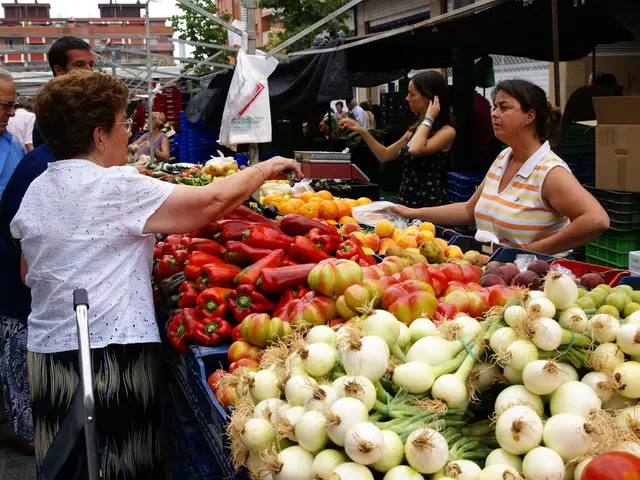Critics of Bukele face prolonged banishment from their native El Salvador
In the small Central American nation of El Salvador, a wave of repression is driving out environmental leaders, human rights activists, and journalists. This exodus comes as President Nayib Bukele consolidates his power, eliminating presidential term limits and extending his term to six years [1][4].
One of the most prominent figures to flee is Amalia Lopez, an environmental leader who was forced to leave the country in April due to pressure. Lopez filed a legal challenge against the lifting of the ban on metal mining by the Bukele-controlled Congress. In May, another environmental defender and community leader was detained while protesting near Bukele's residence [2].
Just a month later, Lopez's colleague Rene Valiente, head of investigations, went into exile along with 20 other activists from Cristosal. Ingrid Escobar, a human rights activist and director of Socorro Juridico (Legal Aid), also fled the country due to escalating repression and the risk of imprisonment [2].
The climate of fear in El Salvador is so widespread that 60% of its citizens fear to publicly express their political opinions [2]. Forty-seven reporters have gone into exile in recent months, according to the professional association APES. Among them is Jorge Beltran, a journalist who worked for 23 years, and who is seeking asylum in another country due to the unsafe environment for free and critical journalism in El Salvador [2].
Escobar, who underwent surgery for a tumor after fleeing El Salvador, is still recovering. She has been a critic of Bukele's state of emergency and believes thousands of innocents are among those detained. About 88,000 people have been detained under Bukele's state of emergency [3].
Ruth Lopez, a lawyer, was arrested in her pyjamas on the night of May 18 by police. Another journalist, Beltran, was warned he was being targeted by the police and decided to leave El Salvador [2]. Beltran plans to create a website to report on events in El Salvador from abroad.
The repression in El Salvador is not limited to political opponents. Beltran denounced corrupt Bukele officials and human rights violations while working for El Diario de Hoy. The crackdown on dissent has involved abuse of power, surveillance, harassment, and suppression of dissent [3].
In summary, Bukele's consolidation of power and the repression of political opponents have led to the exodus of human rights defenders, journalists, and environmentalists from El Salvador. The climate of fear is widespread, with polls showing 60% of Salvadorans fearing to publicly express their political opinions [2].
[1] "Nayib Bukele: El Salvador's president who wants to rule for life." BBC News, 2021. https://www.bbc.com/news/world-latin-america-56621597
[2] "El Salvador: Repression of Opposition and Civil Society." Human Rights Watch, 2021. https://www.hrw.org/news/2021/04/14/el-salvador-repression-opposition-and-civil-society
[3] "El Salvador: Repression of Opposition and Civil Society." Amnesty International, 2021. https://www.amnesty.org/en/latest/news/2021/04/el-salvador-repression-of-opposition-and-civil-society/
[4] "El Salvador: Bukele's Authoritarian Consolidation of Power." Council on Hemispheric Affairs, 2021. https://www.coha.org/el-salvador-bukele-consolidation-of-authoritarian-power/
- The wave of repression in El Salvador is not limited to political opponents; it extends to environmental scientists, such as Rene Valiente, who had to flee the country because of pressure.
- Amalia Lopez, an environmental leader, along with several human rights activists and journalists, have fled El Salvador due to the escalating repression and the risk of imprisonment.
- The effects of climate-change and the policies surrounding environmental-science are proving to be significant factors in the migration patterns of people from El Salvador, as those who speak out against unfavorable practices are being forced to leave.
- The repression in El Salvador has led to a surge in crime and justice issues, as journalists like Jorge Beltran, who denounced corrupt officials and human rights violations, are being targeted by the police.
- The coverage of general-news, particularly concerning the repressive actions of President Bukele, has become increasingly difficult due to the unsafe environment for free and critical journalism in El Salvador, leading to a number of journalists fleeing the country.
- The consolidation of power by President Bukele, marked by the extension of his term to six years and the elimination of presidential term limits, has stirred war-and-conflicts, both political and social, and has resulted in widespread repression, suppressing policy-and-legislation and human rights.





